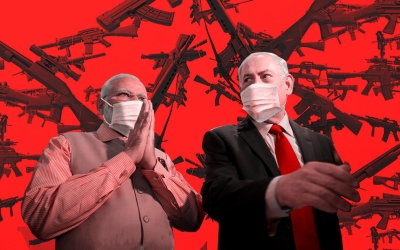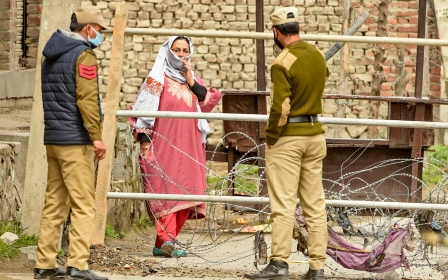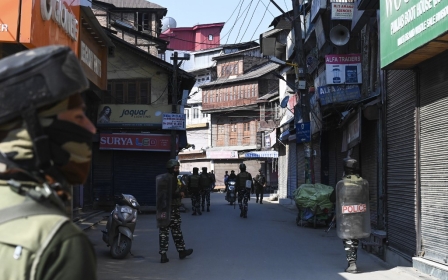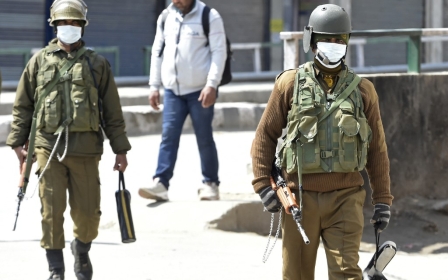Indian army accused of using Kashmiris as human shields in clash with Pakistan
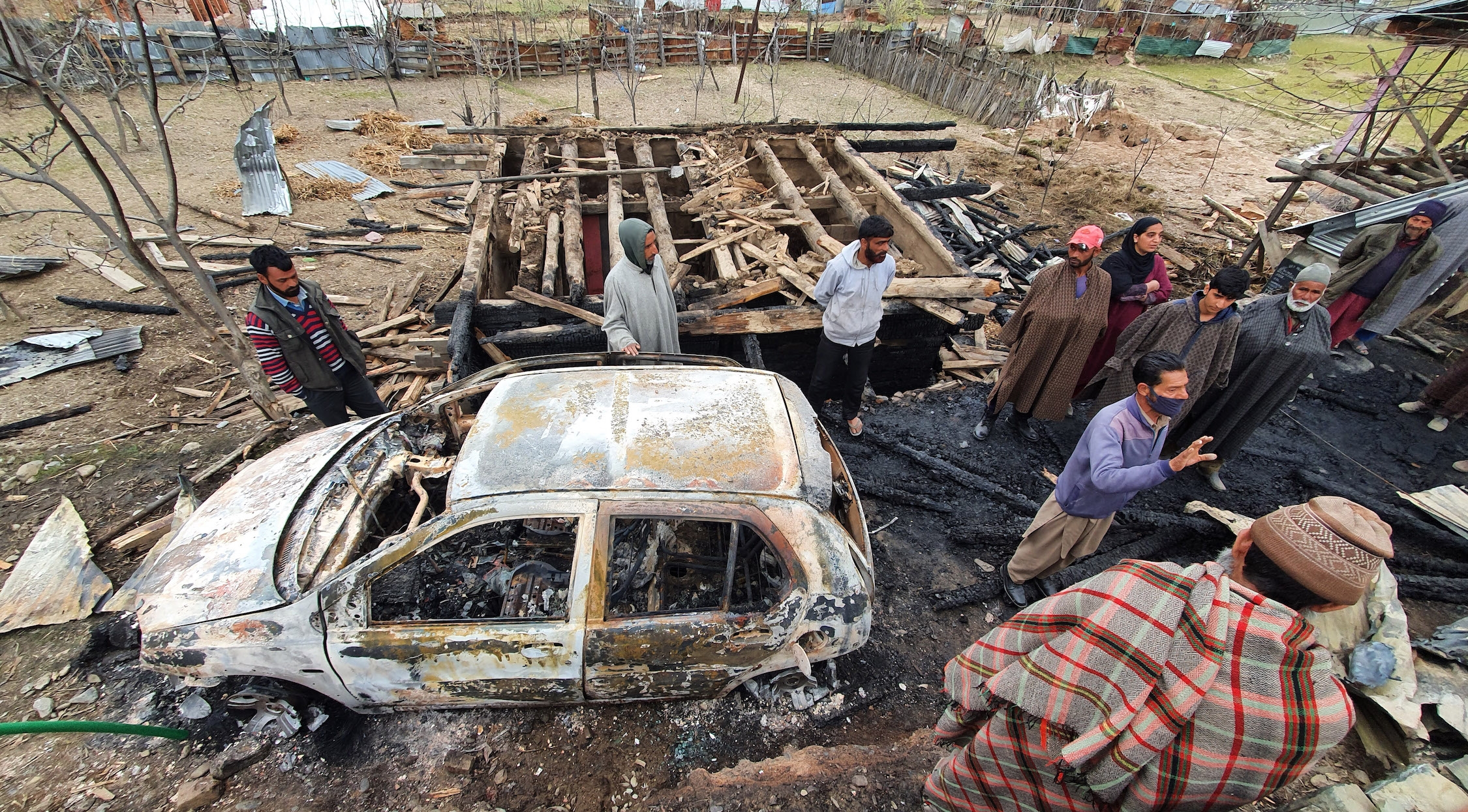
The Indian army has been accused of war crimes after videos emerged of its military firing at targets in Pakistan from civilian areas of Indian-held Kashmir.
Residents in the Muslim-majority village of Panzgam in Kupwara district told Middle East Eye on Monday that Indian forces entered the area with heavy artillery late last week and began using the village as a base to launch attacks against the Pakistani army.
Villagers said that not only were they placed in the direct line of retaliatory attacks but the deafening sound from Bofors artillery guns had damaged homes, terrorised children and turned the quiet village into a war zone.
"We approached the army but they are telling us to leave our houses. Where would we go?" Zaiba Hussain*, a resident of Panzgam, told MEE.
"On the one side, the government is telling us to stay home and maintain social distancing," Hussain said, referring to a raft of measures imposed by Delhi aimed at slowing the spread of the coronavirus.
New MEE newsletter: Jerusalem Dispatch
Sign up to get the latest insights and analysis on Israel-Palestine, alongside Turkey Unpacked and other MEE newsletters
"But when the army fires from these high range weapons, it shakes everything inside our house."
The cross-border attacks began on Friday along the de-facto border that separates Indian and Pakistan-held Kashmir. Both sides have blamed each other for breaching a 2002 ceasefire.
Villagers in Panzgam denounced the Indian army's moves, saying they were more than 20km away from the Line of Control (LoC), and the decision had endangered nearby villages.
"If we knew they would one day enter this area also and make us all human shields we would not have invested our lives into these houses," Hussain said.
"We are crying with fear. Our children and elders are panicking."
'We could not dig the grave properly'
By Monday, three Kashmiri civilians, including an eight-year-old boy, had died in a neighbouring village due to the retaliatory shelling.
"Pakistan today at 5:00pm (local time) initiated unprovoked ceasefire violation in Keran sector. Pakistan now targeting civilian population in Kupwara sector near the LoC resulting in killing three innocent civilians including one woman and a child," Rajesh Kalia, an Indian army spokesman in Srinagar, said in a statement.
Meanwhile, in Pakistan-held Kashmir, a two-year-old boy was killed and four others injured by Indian mortar fire.
Pakistan said the Indian army had "initiated unprovoked ceasefire violations" along the LoC, "deliberately targeting civilian population in Baroh, Dhudnial, Rakhchikri and Chirikot sectors."
While the cross-border shelling has since ceased, residents said the effect of escalating tensions was palpable.
"On Monday morning it was calm, but there is a lot of fear among people. It felt like it's a war," said Irfan Bhat*, whose 36-year-old cousin Shameema Begum was killed by a shell that landed in their garden.
"Yesterday, we laid my cousin to rest. We could not dig the grave properly due to fear."
Replicating Israeli methods
Khurram Parvez, a programme coordinator at the Jammu Kashmir Coalition of Civil Society (JKCCS), told MEE that the Indian army's use of artillery weapons in civilian areas amounted to a "war crime".
"According to our information they have placed 155 mm Bofors [in the village]. This shows the army is hiding in civilian areas turning the civilian population into human shields - this is a war crime.
"It is very clear that [both] countries do not care about civilian lives. And with deaths on [the] Indian side [this] also shows Pakistan in a bad light. It is a psychological war - a war against the people of Kashmir."
Shrimoyee Ghosh, a lawyer and legal anthropologist based in Delhi, agreed, telling MEE that moving artillery positions into residential areas exposed villagers to shelling and deliberately placed them in "the line of enemy fire".
"If it was done deliberately, with the design to deter military attacks, this is a prohibited act of using civilian population as a human shield and would amount to war crime."
Shri Ram Ambarkar, an Indian police officer, said the matter was a "misunderstanding" and was being rectified.
But Ghosh said that the military's actions should be seen as part of "India's widespread disregard for international and domestic laws and principles, and refusal to be subject to any norms in its offensive against Kashmiris."
"In the counter-insurgency war in disputed Kashmir, we have seen the use of human shields, quite often during cordons and searches. In 2016, when video footage emerged of a person tied to a military vehicle, then army chief (Bipin Rawat) actually applauded it as an 'innovative method'," she said.
The Indian army has been frequently accused of using Kashmiris as human shields.
In April 2017, Farooq Ahmed Dar was tied to the front of a jeep and driven on a five-hour journey through several Kashmiri villages at the head of an army convoy. An inquiry was ordered but before it could be completed, the accused army officer was awarded a medal.
"India is blurring the distinction between civilians and military targets - which it has historically done and it must be investigated," Ghosh said.
The Indian army did not respond to MEE's request for comment.
The border escalation comes weeks after the Indian government enacted a domicile law in Indian-held Kashmir, raising fears that it plans to create demographic change and turn the Muslim-majority region into a Hindu majority, replicating Israeli methods in the occupied West Bank.
*Names changed.
Middle East Eye delivers independent and unrivalled coverage and analysis of the Middle East, North Africa and beyond. To learn more about republishing this content and the associated fees, please fill out this form. More about MEE can be found here.


![[MEE]](/sites/default/files/kashmirwar.jpeg)
![Eight-year-old Zeyan died in the shelling over the weekend [Photo Provided]](/sites/default/files/images-story/kashmir_child_2_0.jpg)
